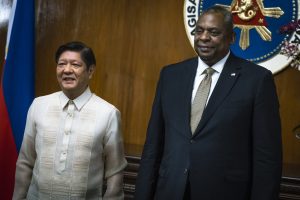China’s government has warned the Philippines that granting the United States military access to more military facilities will “seriously harm Philippine national interests and endanger regional peace and stability,” one of the first outward signs of official Chinese consternation about the rapidly improving security relations between the two allies.
In February, Manila agreed to allow the U.S. military access to four more Philippine military bases under the 2014 Enhanced Defense Cooperation Agreement (EDCA). The agreement allows the U.S. rotational access to a select number of military facilities – originally five – nominated by the Philippine government.
In a statement released Sunday, the Chinese embassy in Manila said that granting the United States greater access to Philippine military bases will drag the Philippines into “geopolitical strife.”
The Chinese statement was issued in response to comments given by U.S. Ambassador to the Philippines MaryKay Carlson during an interview on local television the day before, when she said that the expanded access was meant to allow U.S. forces to respond quickly to humanitarian needs in the region.
“I see EDCA sites are a way for provincial authorities local authorities to enhance their ability not only to defend themselves from a security perspective but to grow their economies,” Carlson said in the interview.
“Whereas the U.S. claims that such cooperation is intended to help the disaster relief efforts of the Philippines and some Americans even tout the EDCA sites as driver of local economy,” the Chinese embassy statement said, “it is plain and simple that those moves are part of the U.S. efforts to encirle [sic] and contain China through its military alliance with this country.”
The statement referenced the recent stirrings of concern about the location and purpose of the four new bases to be included under EDCA, which the Philippine government says are yet to be determined. In particular, worries have been aired in the media by several provincial governors from Luzon, the Philippines’ northernmost island, who are concerned about the possible rotation of U.S. forces through military bases in their provinces.
Senator Imee Marcos also grilled defense officials about the location and purpose of the new site during a recent committee hearing, as I noted at the start of the month. Marcos, the sister of President Ferdinand Marcos Jr., asked why, if the Philippines’ main goal is safeguarding its sovereignty over its areas of the South China Sea, which lies to the country’s west, it is selecting bases in the north.
The Chinese statement restated this controversy as follows: “Is it really in the national interest of the Philippines to get dragged by the U.S. to interfere in the Taiwan question?” It added, “To bundle the Philippines into the chariots of geopolitical strife will seriously harm Philippine national interests and endanger regional peace and stability.”
Shorn of its high-pitched rhetoric about the U.S. attempt to “secure its hegemony and selfish geopolitical interests,” the core claim of the statement – that Washington’s goal in expanding the scope of EDCA is to curb and contain Chinese power – has the merit of being basically correct.
What the statement leaves out is that Chinese actions have played a significant part in the escalatory strategic dynamic in the western Pacific, and that Beijing could be accused of very much the same thing that it criticizes Washington for: that is, seeking to establish its dominance over the region through rapid military modernization and (in China’s case) the staking of expansive claims over nearly the entire South China Sea.
The statement reflects Beijing’s consternation about the rapid warming of Philippine-U.S. ties since Marcos took office last year. It also points to a desire and determination to drive a wedge into take advantage of domestic divisions in the Philippines to advance its own interests.
Above all, it points to the escalatory security dilemma that now underpins China-U.S. relations, in which both sides view the other’s actions as deeply threatening, while seeing their own as defensive and wholly justified. It is a dynamic that bodes ill for the third countries, such as the Philippines, that are most likely to suffer in the event of a conflict.

































